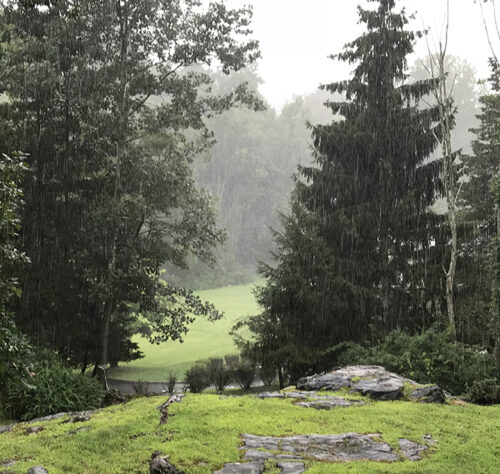
This morning had me scrambling outside for a walk during a brief break from the rain we seem to be getting a lot of lately. Scattered thunderstorms are a summertime staple, the operative word being ‘scattered.’ Rolling thunder. Lightning bolts cracking through the sky, as mystifying and beautiful as they are frightening. Pounding rain that comes and goes, too many days of which can dampen a person’s spirit.
I remember reading long ago about a tribe that runs into the rain instead of running for cover the way I do. This was pre-Google and I can’t track down the essay but I do trust the impression it left in my memory. Then there was MoMA’s enchanting Rain Room exhibition a few years back that had visitors walking through rain without getting wet.
In my day-to-day walks, I can handle light rain, almost welcome it on a hot, summer day. I can even laugh, when I’m caught in a downpour, at my reliance on the hour-by-hour know-before-you-go weather report I check too regularly. Tell the truth—how many times have you heard or said these words: It’s not supposed to rain?
 Rain rain go away
Rain rain go away
Come again another day. . .
We can’t help ourselves, can we? We know there’s really nothing personal about weather. We need rain as much as we need sun. We can’t will away the less-than-welcoming forecast during a vacation on Ibiza. We can only hope for the one constant: everything, including weather, changes.
Children are on my mind a lot these days. Truth be known, they’re always in my mind if not at the top of consciousness. But today, caught in a brief shower (despite the ‘beat the rain’ game I’m playing), I’m picturing immigrant children separated from their parents doing their best to come out and play, rain or no rain. I’m feeling what any decent person with a heart feels re: the heartlessness of an administration that has inflicted this confusion and pain on children.
I’m hearing a toddler crying in a courtroom and a judge embarrassed to ask if he understands the proceedings.
I’m seeing the helplessness on the face of a woman, one of more than 450 sent back to their countries without their children.
Despair is not an option. If nothing else, wishing away the stream of lies (with or with the sex and videotapes) about everything, hoping to wake up one day and breathe a sigh of relief at seeing an end to the collective nightmare acknowledges the reality of how suddenly things can change.
Ten minutes ago it was pouring. Now the sun is out. Change of the political and cultural kind tends to me more gradual, so much going on in the shadows, as the brilliant Rebecca Solnit reminds us in her reissued book of essays, Hope in the Dark. She tells story after story of an “inspired” activism, one that finds common ground between parties normally on different sides of the ‘us and them’ fence. In lieu of the fall from grace paradigm that sets paradise as the bar for an ideal world, she posits the Coyote/trickster motif, in which there never was a fall or a state of grace but creation is ongoing in a world originally brought into being by “flawed, human creators who never finished the job.”
I may not feel much like singing in the rain these days but my spirit gets a little boost when I read about a caravan of grandmothers making a six-day trek to the Mexican border in support of migrant families being held there. Rallies are planned in strategic cities along the way.
Not for nothing, a new body of evidence suggests the crucial role of grandmothers in our evolution. In this emerging view, papa out hunting animals with his bow and arrow gets no more (possibly less) credit for our survival as a species than mama and grandma digging for those heard-to-unearth tubers. Better yet, grandma, with her big eyes and wise heart, may hold the key to the communal spirit, not to mention nurturing, that allowed us to evolve as humans.


